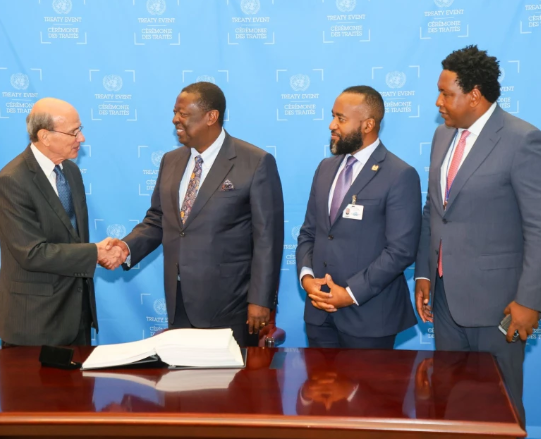Kenya has signed the Agreement on the Sustainable Use of Marine Biological Diversity of Areas Beyond National Jurisdiction (BBNJ), paving the way for the country to benefit from the commercialization of marine resources.
The Agreement aims to regulate the use of complex marine resources, such as viruses, seagrass, seaweeds, marine plants, and various species that have evolved in the ocean over millions of years.
Technological advances have now made it possible to commercialize the ocean’s biodiversity, with some of these resources already being used to produce biodegradable plastics and pharmaceuticals—industries worth billions of dollars.
Previously, only developed countries with advanced technologies were benefiting from these resources. However, the BBNJ Agreement includes provisions for countries like Kenya to share in the harvesting and commercialization of these resources through a benefit-sharing formula that will be established once the Agreement is ratified.
Speaking after signing the agreement, Prime Cabinet Secretary Musalia Mudavadi emphasized, “Once ratified, Kenya will be able to participate and benefit from the proceeds of biodiversity resources from the ocean.” He further stated that the Kenyan government is committed to ensuring the country benefits from ocean resources beyond the traditional maritime transport and fisheries.
“The ocean holds vast non-living resources, including minerals that are driving industrial growth in green energy and electronics,” Mudavadi noted. He also highlighted the potential of the oceans to provide not only food but also crucial opportunities for development and employment.
Mudavadi underscored that coastal communities have long depended on the ocean for food, livelihoods, and well-being, but its resources extend far beyond the shore. “Recent research shows that ocean resources are essential for all people, contributing to medicine, green technologies, nutrition, and more,” he said.
In signing the BBNJ Agreement on ocean governance, Mudavadi affirmed Kenya’s shared commitment to protecting the health of the oceans.
He noted that the principle of the common heritage of humankind, as outlined in the United Nations Convention on the Law of the Sea, demonstrates that the health and wealth of our oceans are intrinsically tied to our collective actions.
“Kenya fully aligns with the principles, rights, and obligations regarding the preservation and protection of marine resources, as contained in the Convention and further elaborated in the BBNJ Agreement,” he said.
“The Agreement completes the legal framework for the governance of the ocean. Kenya welcomes the BBNJ Agreement, as it provides a framework for the utilization and regulation of marine biodiversity in international waters,” Mudavadi stated.
He further emphasized that, in addition to benefiting from the global sharing of resources, the Kenyan government is committed to building the capacity and competencies of its scientists and other officials to help the country leverage these resources to enhance and diversify its manufacturing sectors.
“These resources are used for the commercial production of biochemical products, pharmaceuticals, and beauty industries,” he noted. Mudavadi expressed optimism over commercial seaweed production, which is already being tested in Kibuyuni and other coastal areas, adding that proceeds from seaweed sales have positively impacted the economic empowerment of local communities.
The Prime Cabinet Secretary also stressed that while the signing and ratification of the BBNJ Agreement are important steps, the real success in protecting the oceans hinges on the willingness of states to implement the provisions of the Agreement.
“To achieve this, we must prioritize capacity building for developing countries, scientific research, knowledge sharing, and the involvement of Indigenous and local communities, whose traditional knowledge is invaluable to conserving marine biodiversity.”
Mudavadi highlighted Kenya’s ongoing efforts to reduce ocean pollution caused by plastics. “Kenya has banned the manufacturing and distribution of non-recyclable plastics. This, along with a series of other policy measures to address ocean pollution, demonstrates our commitment to protecting the oceans as part of our collective vision for a healthier planet,” he affirmed.
Ms. Juster Nkoroi, Head of the Kenya International Boundaries Office, noted that the Agreement on the Sustainable Use of Marine Biological Diversity of Areas Beyond National Jurisdiction (BBNJ) took over 20 years to negotiate before its adoption in 2023 and subsequent opening for signatures the same year.
“The negotiation process took a very long time, and the signing of the Agreement is a breakthrough, not just for Kenya but for the world as a whole,” she remarked.
Kenya’s delegation to the negotiations was led by the Office of the Attorney General & Department of Justice, supported by officials from various ministries and agencies, including the Ministry of Foreign and Diaspora Affairs, the Kenya International Boundaries Office, the Ministry of Petroleum and Mining, the Kenya Maritime Authority, the National Environmental Management Authority (NEMA), the Ministry of Fisheries and Blue Economy, and the Kenya Marine Fisheries Research Institute.
Ms. Nkoroi emphasized that Kenya has consistently played a key role in negotiations concerning ocean governance, beginning with the United Nations Convention on the Law of the Sea in the 1970s and continuing with the BBNJ Agreement.
She further highlighted that Kenya is one of the developing coastal states that has made significant advancements in establishing its maritime zones, including the outer continental shelf beyond 200 nautical miles.
She pointed out that the resources covered by the BBNJ Agreement go beyond deep-sea non-living resources. Ms. Nkoroi noted that the global race for critical minerals has extended to the ocean’s depths, where untapped resources in “The Area” hold the potential to drive future technological and economic advancements.
As the world transitions to clean energy and advanced technologies, the demand for minerals such as cobalt, nickel, and rare earth elements has surged. Deep-sea mining, governed by the International Seabed Authority (ISA), presents a new frontier for meeting these demands, offering countries like Kenya a unique opportunity to secure these resources and assert their role on the global stage.
Kenya, she said, is actively participating in the development of deep-sea mining regulations under the ISA, and many Kenyan scientists have benefited from training programs related to the exploration of these resources. Ms. Nkoroi expressed optimism that, with continued capacity building, Kenya will soon join other countries in the exploration and exploitation of ocean resources.



